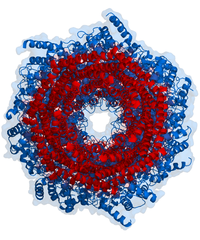
Heme-dependent recognition of 5-aminolevulinate synthase by the human mitochondrial molecular chaperone ClpX.
Sign Up to like & getrecommendations! Published in 2021 at "FEBS letters"
DOI: 10.1002/1873-3468.14214
Abstract: The caseinolytic mitochondrial matrix peptidase chaperone subunit (ClpX) plays an important role in the heme-dependent regulation of 5-aminolevulinate synthase (ALAS1), a key enzyme in heme biosynthesis. However, the mechanisms underlying the role of ClpX in… read more here.
Keywords: dependent recognition; clpx; alas1; aminolevulinate synthase ... See more keywords

Progress and Prospect of Single-molecular ClpX ATPase Researching system-a mini-review.
Sign Up to like & getrecommendations! Published in 2021 at "Gene"
DOI: 10.1016/j.gene.2021.145420
Abstract: ClpXP in Escherichia coli is a proteasome degrading protein substrates. It consists of one hexamer of ATPase (ClpX) and two heptamers of peptidase (ClpP). The ClpX binds ATP and translocates the substrate protein into the… read more here.
Keywords: mini review; progress; atpase; single molecular ... See more keywords

ClpX/P-Dependent Degradation of Novel Substrates in Streptococcus mutans
Sign Up to like & getrecommendations! Published in 2022 at "Journal of Bacteriology"
DOI: 10.1128/jb.00594-21
Abstract: ClpX/P is a major intracellular proteolytic complex that is responsible for protein quality control in the cell. ClpX, an AAA+ ATPase, distinguishes the potential substrates by recognizing short motifs at the C-terminal end of proteins… read more here.
Keywords: clpx substrates; dependent degradation; streptococcus mutans; clpx ... See more keywords

Selectivity among Anti-σ Factors by Mycobacterium tuberculosis ClpX Influences Intracellular Levels of Extracytoplasmic Function σ Factors
Sign Up to like & getrecommendations! Published in 2019 at "Journal of Bacteriology"
DOI: 10.1128/jb.00748-18
Abstract: The ability of Mycobacterium tuberculosis to quickly adapt to changing environmental stimuli occurs by maintaining protein homeostasis. Extracytoplasmic function (ECF) σ factors play a significant role in coordinating the transcription profile to changes in environmental… read more here.
Keywords: extracytoplasmic function; mycobacterium tuberculosis; anti factors; tuberculosis ... See more keywords

Tag-Dependent Substrate Selection of ClpX Underlies Secondary Differentiation of Chlamydia trachomatis
Sign Up to like & getrecommendations! Published in 2022 at "mBio"
DOI: 10.1128/mbio.01858-22
Abstract: Chlamydia trachomatis is the leading cause of bacterial sexually transmitted infections and preventable infectious blindness. This unique organism undergoes developmental transitions between infectious, nondividing forms and noninfectious, dividing forms. ABSTRACT Despite having a highly reduced… read more here.
Keywords: secondary differentiation; chlamydia trachomatis; chlamydia; clpx ... See more keywords

The Essential Role of ClpXP in Caulobacter crescentus Requires Species Constrained Substrate Specificity
Sign Up to like & getrecommendations! Published in 2017 at "Frontiers in Molecular Biosciences"
DOI: 10.3389/fmolb.2017.00028
Abstract: The ClpXP protease is a highly conserved AAA+ degradation machine that is present throughout bacteria and in eukaryotic organelles. ClpXP is essential in some bacteria, such as Caulobacter crescentus, but dispensible in others, such as… read more here.
Keywords: caulobacter; clpx; clpxp; role ... See more keywords

A Staphylococcus aureus clpX Mutant Used as a Unique Screening Tool to Identify Cell Wall Synthesis Inhibitors that Reverse β-Lactam Resistance in MRSA
Sign Up to like & getrecommendations! Published in 2021 at "Frontiers in Molecular Biosciences"
DOI: 10.3389/fmolb.2021.691569
Abstract: Staphylococcus aureus is a leading cause of bacterial infections world-wide. Staphylococcal infections are preferentially treated with β-lactam antibiotics, however, methicillin-resistant S. aureus (MRSA) strains have acquired resistance to this superior class of antibiotics. We have… read more here.
Keywords: clpx; resistance; mrsa; cell wall ... See more keywords

Insight into the RssB-Mediated Recognition and Delivery of σs to the AAA+ Protease, ClpXP
Sign Up to like & getrecommendations! Published in 2020 at "Biomolecules"
DOI: 10.3390/biom10040615
Abstract: In Escherichia coli, SigmaS (σS) is the master regulator of the general stress response. The cellular levels of σS are controlled by transcription, translation and protein stability. The turnover of σS, by the AAA+ protease… read more here.
Keywords: recognition delivery; clpx; recognition; rssb ... See more keywords